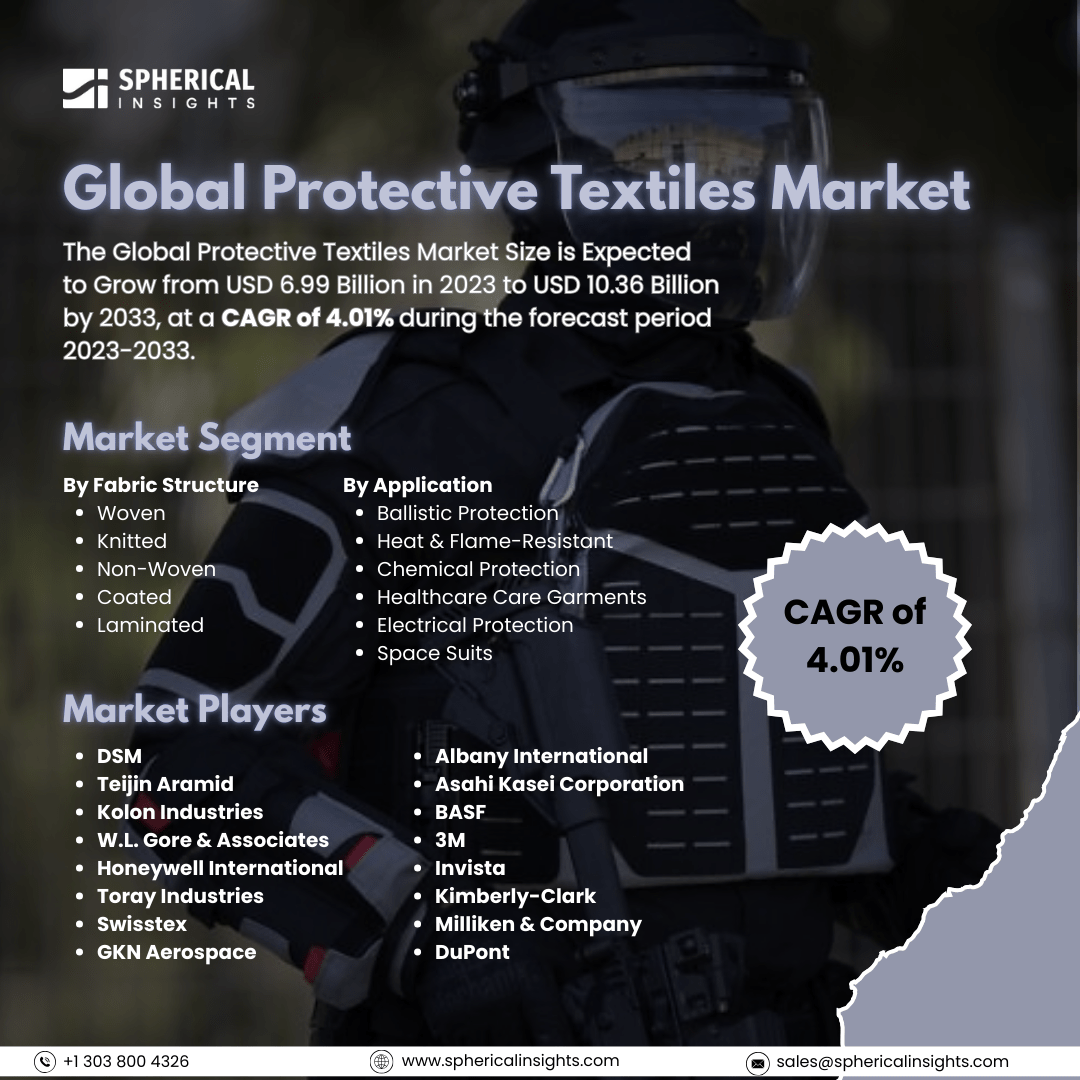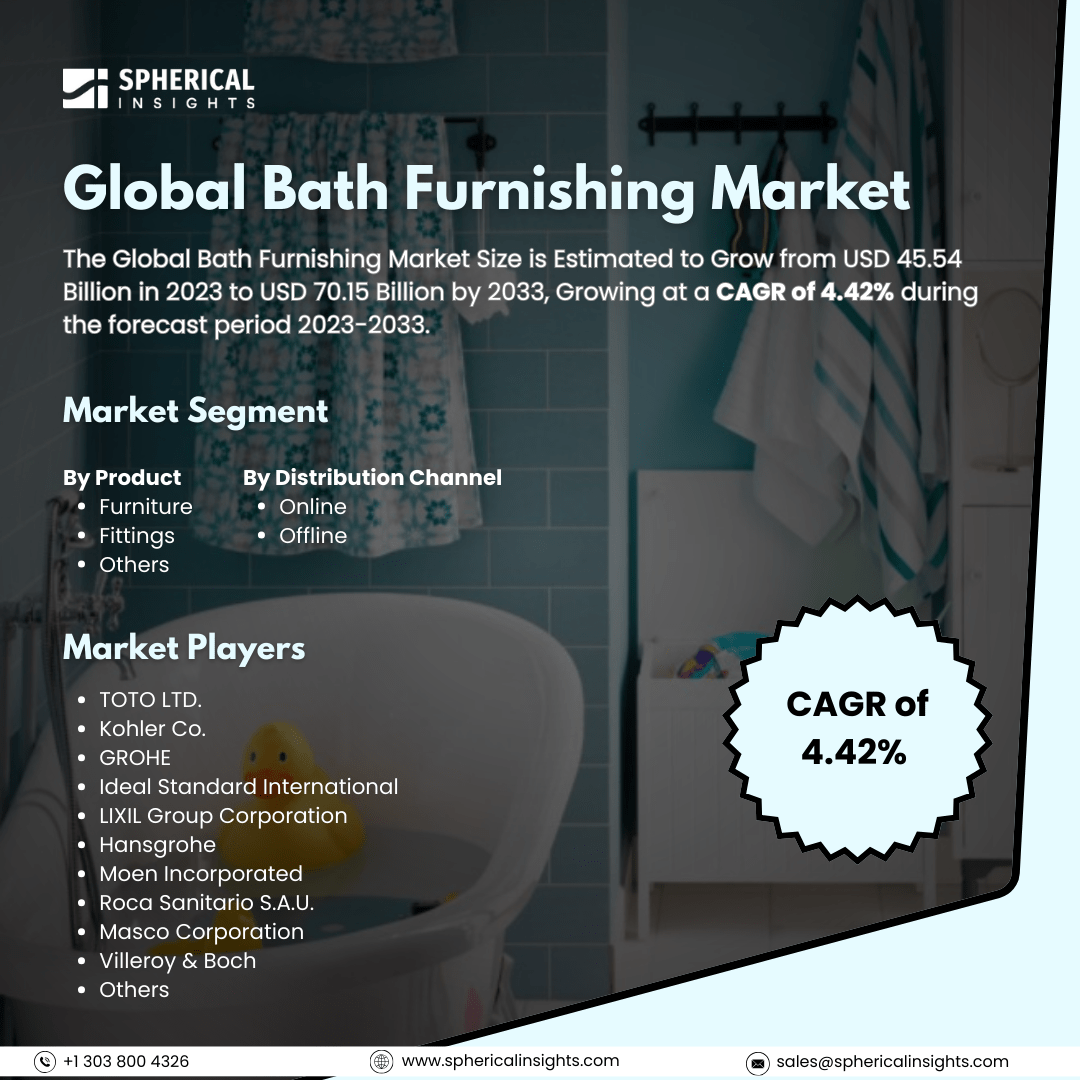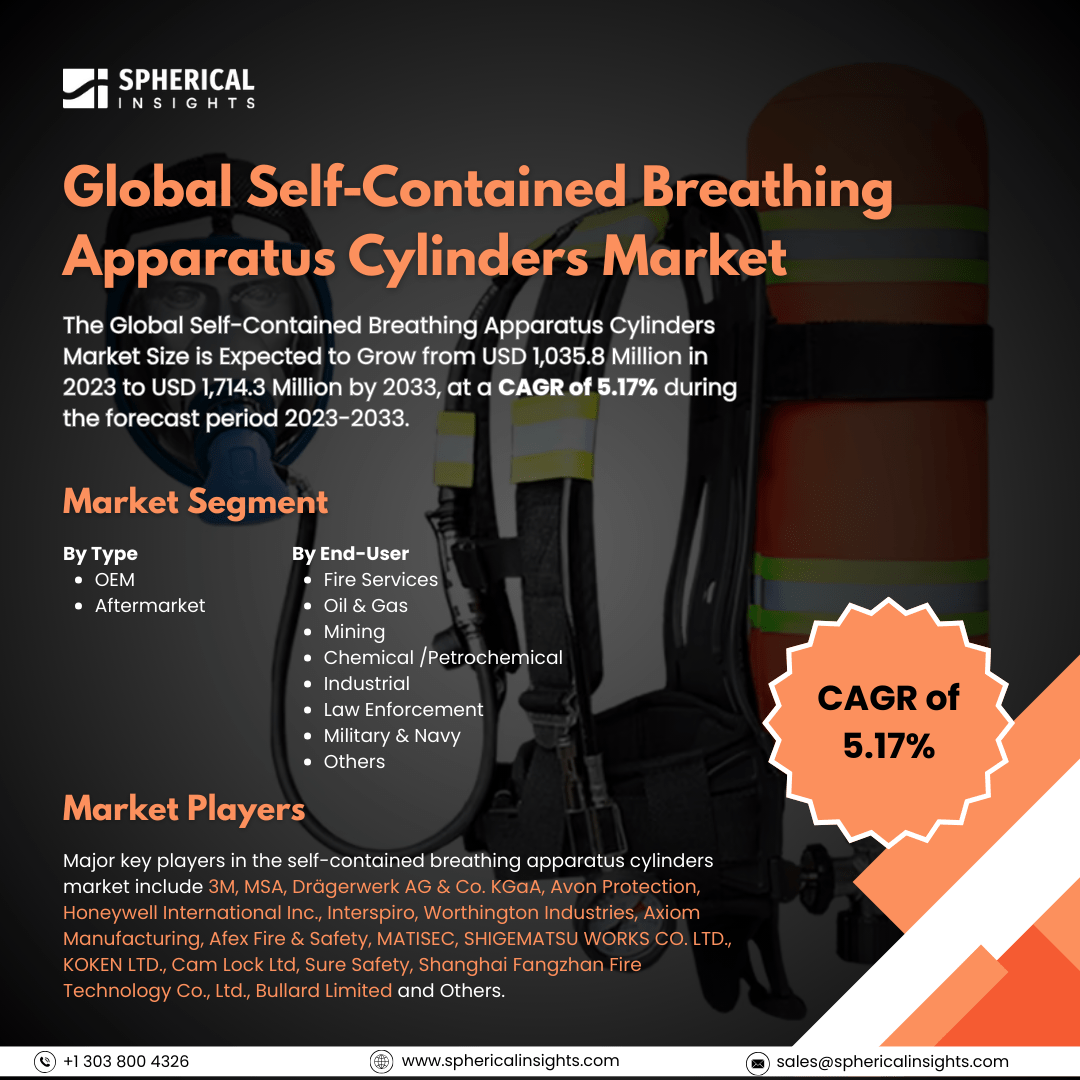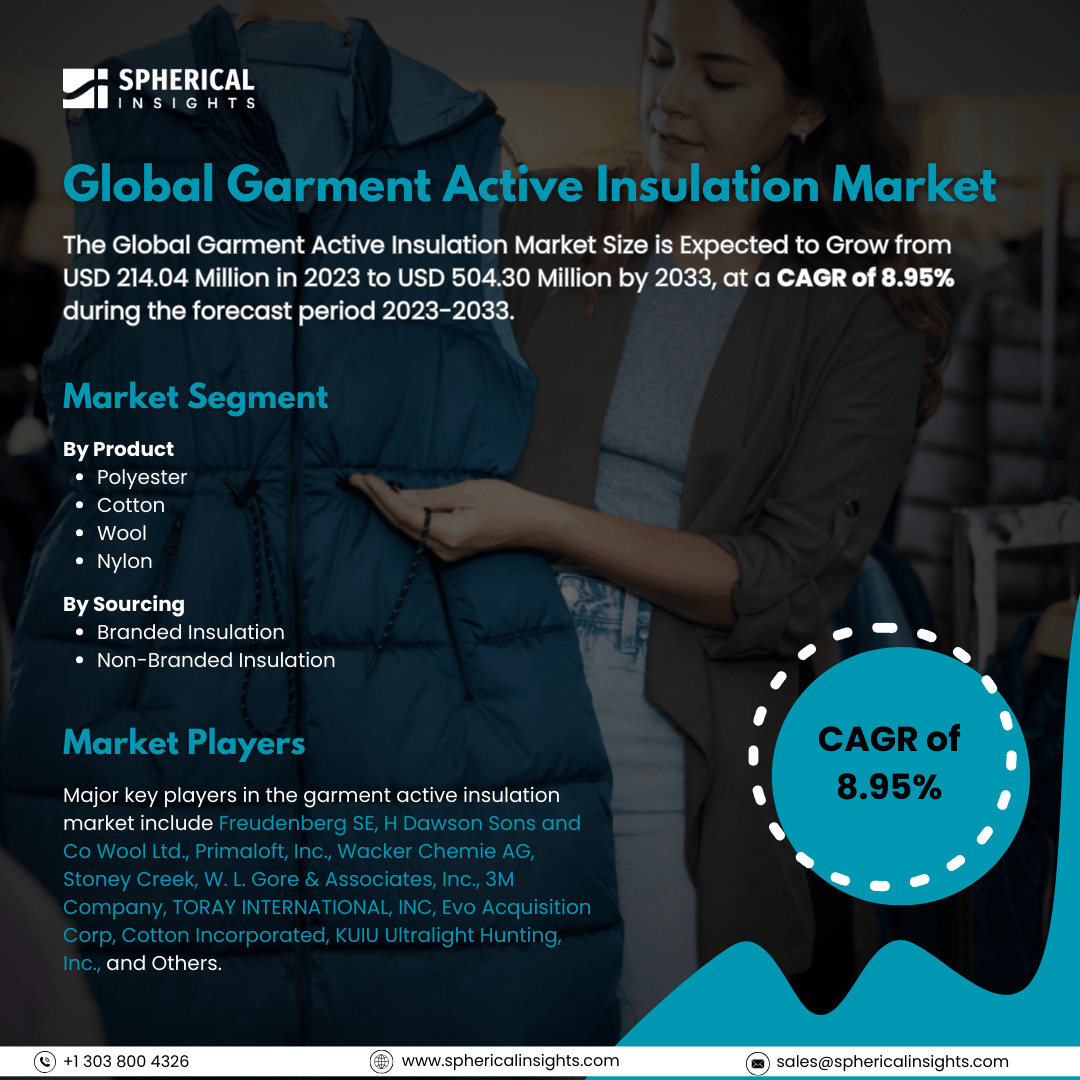Global Protective Textiles Market Size to worth USD 10.36 Billion by 2033
According to a research report published by Spherical Insights & Consulting, The Global Protective Textiles Market Size is Expected to Grow from USD 6.99 Billion in 2023 to USD 10.36 Billion by 2033, at a CAGR of 4.01% during the forecast period 2023-2033.
Browse key industry insights spread across 210 pages with 110 Market data tables and figures & charts from the report on the Global Protective Textiles Market Size, Share, and COVID-19 Impact Analysis, By Fabric Structure (Woven, Knitted, Non-Woven, Coated, and Laminated), By Application (Ballistic Protection, Heat & Flame-Resistant, Chemical Protection, Healthcare Care Garments, Electrical Protection, and Space Suits), and By Region (North America, Europe, Asia-Pacific, Latin America, Middle East, and Africa), Analysis and Forecast 2023 – 2033.
The manufacture, distribution, and use of textiles intended to protect people from a range of risks are all part of the global protective textiles market. These textiles are designed to offer defense against hazards that are thermal, chemical, biological, radiation, and physical. They are employed in many different fields, including as the military, firefighting, healthcare, construction, and industrial sectors. Technological advancements have led to the creation of innovative protective textiles, offering enhanced protection against hazards like heat, flames, chemicals, and biological agents. These textiles, integrating nanotechnology, smart materials, and advanced fiber engineering techniques, are lightweight, breathable, and durable, expected to drive their adoption in military, firefighting, and industrial sectors. The use of protective textiles in industries like manufacturing, construction, healthcare, and defense is increasing due to stricter regulations and growing awareness of workplace-related injuries. The healthcare sector, particularly during pandemics, requires PPE for gowns, masks, and gloves. Sports equipment, outdoor activities, and infrastructure projects also require protective textiles. Advancements in textile technology have created more comfortable, durable, and breathable textiles, enhanced worker satisfaction and compliance, and fueling market growth. However, high-performance fibers like aramid and UHMW PE can increase protective textile costs, while complex safety and environmental regulations can hinder market growth.
The woven segment accounted for the largest share in 2023 and is expected to grow at a significant CAGR during the forecast period.
Based on the fabric structure, the protective textiles market is classified into woven, knitted, non-woven, coated, and laminated. Among these, the woven segment accounted for the largest share in 2023 and is expected to grow at a significant CAGR during the forecast period. High strength, durability, and rip resistance make woven materials ideal for use in protective apparel, including military uniforms and fireman suits.
The ballistic protection segment accounted for the highest market share in 2023 and is expected to grow at a substantial CAGR during the forecast period.
Based on the application, the protective textiles market is divided into ballistic protection, heat & flame-resistant, chemical protection, healthcare care garments, electrical protection, and space suits. Among these, the ballistic protection segment accounted for the highest share in 2023 and is expected to grow at a substantial CAGR during the forecast period. The demand for ballistic protection clothing is on the rise due to rising violent crimes, civil unrest, and terrorist activities. Law enforcement, military, and security personnel are investing in high-quality clothing to protect their lives. Advancements in textile technology are also driving market growth.
North America is estimated to hold the largest share of the protective textiles market over the forecast period.
North America is estimated to hold the largest share of the protective textiles market over the forecast period. Strict legal structures, such as OSHA regulations, guarantee adherence to safety precautions. Furthermore, the region's market supremacy has been aided by the existence of significant protective textile suppliers and manufacturers. The region's strong economy and growing consciousness of workplace dangers have increased demand for protective textiles in several sectors, such as construction, manufacturing, and healthcare.
Asia Pacific is predicted to have the fastest CAGR growth in the protective textiles market over the forecast period. The growing industrialization of the region, especially in nations like China, India, and Japan, has increased the demand for protective gear to protect workers in construction, manufacturing, and other sectors. Furthermore, the protective textiles sector has a lot of prospects due to the region's huge population and varied economic environment.
Company Profiling
Major key players in the protective textiles market include DSM, Teijin Aramid, Kolon Industries, W.L. Gore Associates, Honeywell International, Toray Industries, Swisstex, GKN Aerospace, Albany International, Asahi Kasei Corporation, BASF, 3M, Invista, Kimberly-Clark, Milliken Company, DuPont, and Others.
Recent Development
- In January 2025, the Circuline Innovation Lab was established by Supreme Nonwoven as a ground-breaking project to revolutionize the design and manufacture of sustainable materials. The goal of this lab is to create sustainable nonwoven materials for a range of uses.
Key Target Audience
- Market Players
- Investors
- End-users
- Government Authorities
- Consulting And Research Firm
- Venture capitalists
- Value-Added Resellers (VARs)
Market Segment
This study forecasts revenue at global, regional, and country levels from 2023 to 2033. Spherical Insights has segmented the protective textiles market based on the below-mentioned segments:
Global Protective Textiles Market, By Fabric Structure
- Woven
- Knitted
- Non-Woven
- Coated
- Laminated
Global Protective Textiles Market, By Application
- Ballistic Protection
- Heat & Flame-Resistant
- Chemical Protection
- Healthcare Care Garments
- Electrical Protection
- Space Suits
Global Protective Textiles Market, By Regional Analysis
- North America
- Europe
- Germany
- UK
- France
- Italy
- Spain
- Russia
- Rest of Europe
- Asia Pacific
- China
- Japan
- India
- South Korea
- Australia
- Rest of Asia Pacific
- South America
- Brazil
- Argentina
- Rest of South America
- Middle East & Africa
- UAE
- Saudi Arabia
- Qatar
- South Africa
- Rest of the Middle East & Africa



